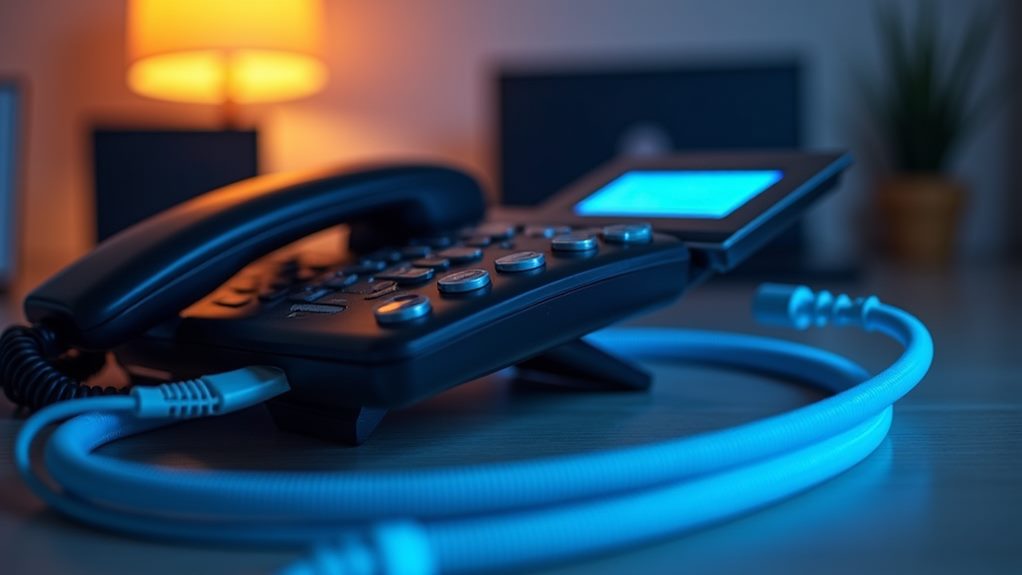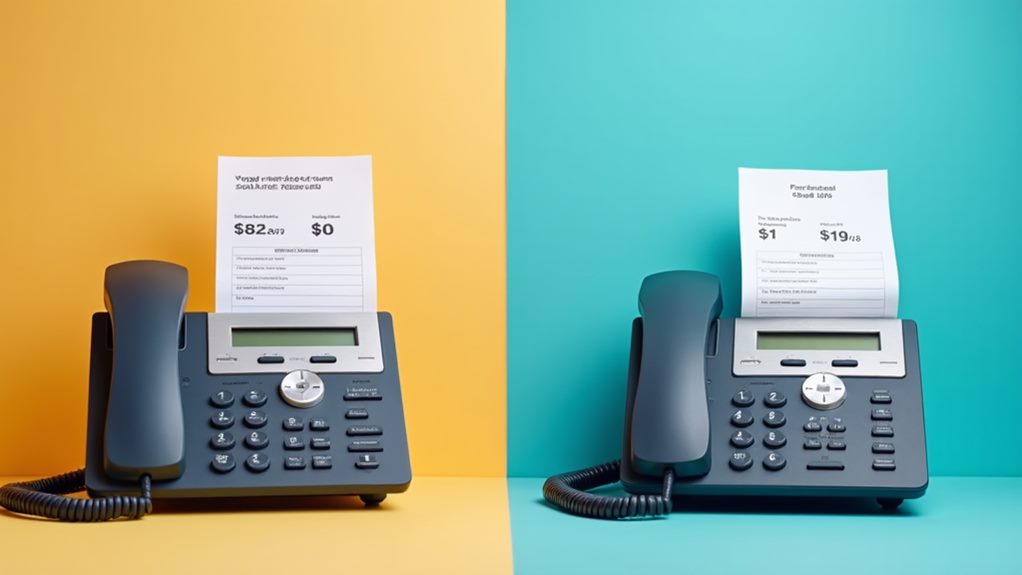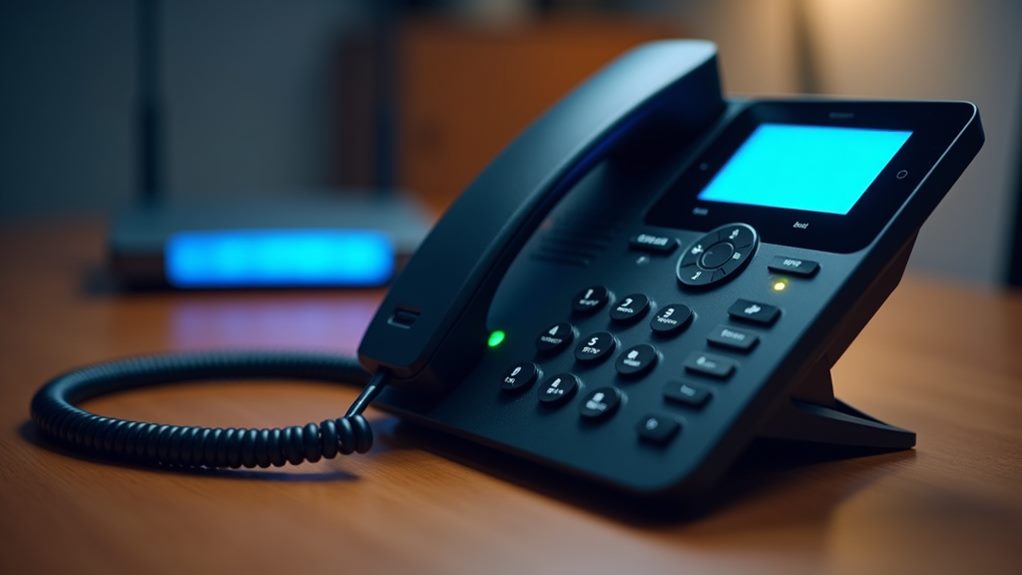Plusnet doesn't currently offer VoIP services, as they're focusing on changing their traditional landline infrastructure to fibre-based systems. If you're a current Plusnet landline customer paying over £10 monthly for unlimited UK calls, you'll need to evaluate alternative VoIP providers like Sipgate (£2/month) or Andrews & Arnold for future service. You can port your existing number within a 30-day window after service discontinuation, and VoIP solutions typically offer 40-60% cost savings compared to traditional systems. Understanding the complete change process and reliability factors will help you make an informed decision for your communication needs.
Current Plusnet Phone Service Status

Plusnet's landline phone service is undergoing a significant change period as the provider shifts to fibre-only infrastructure for new customers.
If you're currently using Plusnet's traditional landline service, you'll find that your existing phone package, which costs over £10 monthly for unlimited UK calls, remains active for now. However, you should be aware that this traditional communication system is being phased out.
As businesses increasingly adopt cost-effective communication solutions like VoIP for their operations, the need for traditional systems is diminishing.
While you can still renew your contract with landline services if you're an existing customer, you'll need to prepare for eventual modifications to your phone service.
When you decide to switch to Plusnet's fibre-only broadband service, you won't have access to VoIP or digital voice alternatives through the provider. This means you'll need to evaluate alternative providers to maintain voice communications.
If keeping your existing number is important to you, you'll have a 30-day window after service discontinuation to port it to another provider. Be aware that initiating the porting process will affect your broadband service.
Unlike other major providers who've integrated VoIP solutions, Plusnet currently doesn't offer digital voice alternatives for customers shifting from traditional landlines.
Alternative VOIP Service Options
As traditional landline services phase out, several VoIP providers offer viable alternatives to fill the gap left by Plusnet's limited voice options.
You'll find established providers like Sipgate delivering VOIP service at competitive rates around £2 monthly, while Andrews & Arnold (A&A) stands out for its thorough customer support and reliable solutions for your landline needs.
With the ability to save small businesses 40-60% in communication costs compared to traditional systems, VoIP's affordability makes it an attractive choice for many. Additionally, the scalability of VoIP enables businesses to adapt their communication systems as they grow, accommodating future needs.
When considering alternative providers, you'll want to evaluate several key factors. First, determine if you can port your existing number to the new service.
While most providers support number porting, you should verify your eligibility and prepare for potential service disruptions during the adjustment period. Additionally, you'll need to account for power outages, as VOIP services require electricity to function, unlike traditional copper lines.
A&A and Sipgate represent just two options in a growing marketplace of VOIP providers catering to former landline users.
Each offers distinct advantages: A&A excels in technical support and service reliability, while Sipgate appeals to cost-conscious users seeking straightforward solutions.
You'll need to weigh these factors against your specific requirements to select the most suitable alternative.
Number Porting and Transition Process

When switching to a new VoIP provider, understanding the number porting process becomes a key factor in maintaining service continuity. Since Plusnet doesn't offer VoIP service, you'll need to carefully manage your changeover to guarantee you don't lose your existing phone number during the switch from your landline service.
To begin with, phone number portability allows you to keep your existing number when moving to VoIP, so it's crucial to familiarize yourself with the process and timeline for number transfer to avoid complications.
You'll want to begin your changeover process early, as you have only 30 days after your existing service ends to complete the number porting process. Before initiating the switch, verify that your phone number is eligible for porting to your chosen VoIP provider.
Pay particular attention if you're planning to move addresses, as geographic numbers can face complications when ownership is tied to specific locations.
To guarantee a smooth changeover, follow these critical steps:
- Confirm your number's portability status
- Select your new VoIP provider before ending your current service
- Submit porting requests within the required timeframe
- Maintain your existing service until the porting process completes
- Document all communication with your new provider
This systematic approach helps prevent service interruptions and protects your valuable phone number during the changeover to VoIP technology.
Service Reliability During Power Outages
The critical weakness of VoIP systems lies in their dependence on electrical power, creating potential service interruptions during outages that traditional landlines don't experience.
When you're using VoIP service, you'll need to take into account that power cuts can completely disrupt your ability to make emergency calls, unlike traditional PSTN lines that remain operational during blackouts.
To maintain service reliability, you'll want to invest in backup power solutions. An Uninterruptible Power Supply (UPS) system becomes essential for your VoIP setup, especially recognizing that typical outages can last anywhere from 1-2 hours for brief interruptions to 8-9 hours for more severe power cuts.
This backup system guarantees you're not left without communication when you need it most.
The shift challenges are particularly significant if you're part of vulnerable groups or elderly communities who've historically relied on landline dependability.
You'll need to assess the benefits of VoIP against the potential risks during power outages.
Remember that while traditional PSTN lines offer built-in reliability during blackouts, your VoIP system's functionality depends entirely on maintaining power to both your internet connection and VoIP equipment.
Cost Comparisons Between Providers

Moving beyond power reliability concerns, cost analysis reveals significant pricing variations among VoIP providers. While Plusnet doesn't currently offer a VoIP service, you'll find compelling alternative providers that could deliver substantial savings compared to traditional landline service.
When evaluating monthly costs, Sipgate's £2 monthly fee presents a stark contrast to Plusnet's £10+ landline package for unlimited UK calls.
To maximize your cost-effectiveness when considering VoIP alternatives, focus on these key factors:
- Initial setup costs, including fees to port the number from your existing service
- Monthly service charges from providers like Andrews & Arnold (A&A) versus your current Plusnet plan
- Potential savings from canceling your Plusnet Anytime call plan (£10+ monthly)
You'll need to carefully weigh the financial implications of switching, particularly if you're considering Plusnet's new fibre service without a phone line.
The effective options available through VoIP providers could lead to significant long-term savings, but remember to account for number porting fees and setup costs in your calculations.
Compare detailed cost breakdowns across multiple providers to guarantee you're selecting the most economical solution for your needs.
Final Thoughts
Properly picking Plusnet means proceeding without provider-specific VOIP presently. You'll need to pursue partner platforms or third-party telecommunications tools for VOIP solutions. While traditional telephone service shifts trend toward IP-based infrastructure, Plusnet's portfolio primarily preserves conventional copper connections. Consider compatible carriers like RingCentral or 8×8 for dedicated VOIP deployment, ensuring seamless SIP protocol support and sufficient bandwidth allocation for quality voice transmission.

